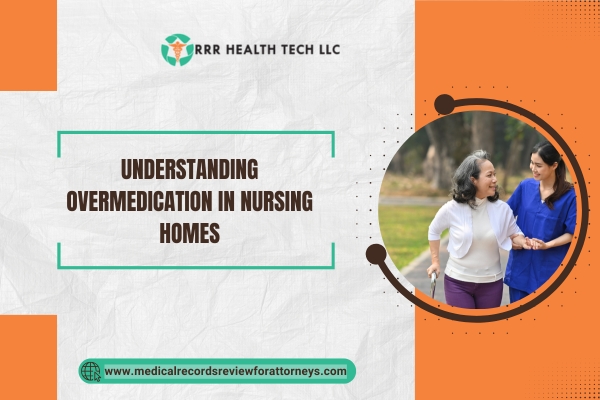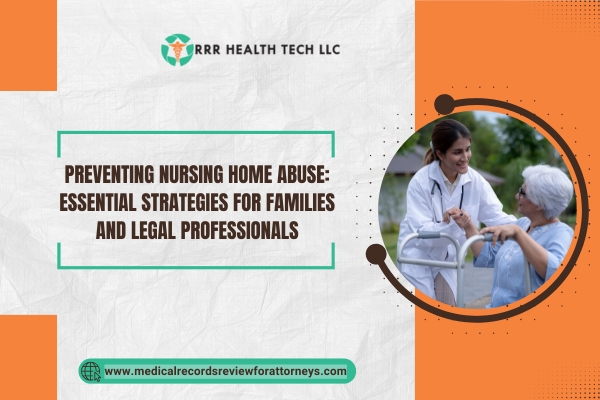
Introduction
Medication in nursing homes can potentially be harmful to a resident’s health if nursing home staff and doctors do not take the action necessary in terms of legal insight, this being an appropriate course of action to be on the lookout for for lawyers who represent nursing home abuse. Keeping this in mind, this article goes over overprescribing terminology along with other detailed aspects concerned with the matter in order to help lawyers gain a better understanding of the issue.
1. What is Overmedication?
Definition and Scope
Overmedication occurs when a patient receives more medication than is medically necessary, often leading to adverse health effects. In nursing homes, this can result from inadequate assessments, staff shortages, or a culture that prioritizes chemical restraint over proper care.
Common Medications Involved
The medications involved with the overmedication of patients in nursing homes can include, but are not limited to, antipsychotic, sedative and opioids. These vital drugs if not taken properly can have a lasting effect on s a resident’s mental and physical health which would result in negatively impacting and lowering their standard of living.
2. Signs of Overmedication in Nursing Home Residents
Behavioral Changes
If a resident is experiencing agitation, confusion or even a more general withdrawal feeling, those are considered ‘red flags’ and those indications combined with other unusual tendencies are a sign of overmedication, which allows for further inquiries to me made.
Physical Symptoms
Some visible signs of excessive dose include dizziness, excessive sleepiness, falling down, and unexplained bruises. Such symptoms should be looked out for by caregivers or family members.
Medical Records Indicators
There have been instances where overmedication indicators such as changing prescription drugs frequently or there being no documentation of evaluations before a medication change happens, have been found through reviewing medical files. Such points can be useful for lawyers in supporting a case.
3. Risks Associated with Overmedication
Health Complications
Over dosage can result in irreversible health problems which may include but are not limited to decline in cognition, higher chances of falling and sometimes even death. Keeping these risks in mind is necessary for the lawyers fighting for the victims’ needs.
Legal Consequences of Facilities
Pressure ulcer claims can result in a nursing home getting alleged for overmedicating their elderly guests, which can lead to legal action against them and other types of penalties. This information can also be used by lawyers practicing against such negligent institutions.
4. The Role of Medical Record Review in Overmedication Cases
Importance of Accurate Documentation
Accurate medical documentation is critical in overmedication cases. It provides evidence of the medications prescribed, the rationale behind them, and any changes in the resident’s condition.
How Medical Record Review Services Assist Attorneys
Medical record review services can assist attorneys by:
- Searching medical records for discrepancies or signs of over medicate.
- Scanning medical records to determine if there are signs of over medication.
- Reviewing the appropriateness of a doctor’s prescription on a medication case.
5. Legal Framework Surrounding Overmedication
Relevant Laws and Regulations
There are different laws and policies that control the use of medications in nursing homes, such as the Nursing Home Reform Act and individual state regulations. Attorneys must understand these laws so that they can defend their clients appropriately.
Case Law Examples
Knowledge of case law is essential in understanding what courts have ruled on issues concerning overmedication, for example, the cases where facilities were similarly sued for not ensuring that residents’ medications were properly monitored can be useful as precedents.
6. Common Challenges in Proving Overmedication Cases
Gathering Evidence
One of the major difficulties in the prosecution of cases concerning overmedication is establishing the abuse. Attorneys ought to be more active in retrieving and obtaining medical records, statements from witnesses and expert opinions.
Overcoming Defense Strategies
Nursing homes can use various defense strategies such as saying that the medications were necessary and advisable for the residents. Attorneys will have to gather evidence and expert opinions against the effects of overmedication to argue such points.
7. Case Studies
Case Study 1:
Overview: Unmonitored treatment of a resident at a nursing home with antipsychotic drugs has resulted in deterioration of their cognition and mentally status.
Challenges: The resident’s family reported observable behavioral changes but were opposed by the nursing home while lodging their complaints.
Solutions: After obtaining detailed medical records of the resident, the attorney was able to prove that there were no evaluations or justifiable need for restrained medication. Expert opinion was sought to show the influence of polypharmacy in aged patients.
Compensation: The case ended in the settlement of the case that provided monetary compensation to the family as well as underscored the need for enhanced policies and protocols in the facility concerning the prescription of medicines.
Case Study 2:
Description: A 56 year old patient sustained injuries on account of falling during their residence in a nursing facility, owing to tardive dyskinesia and increase in medication dosage by the physician.
Challenges: The assisting team comprising of nurses and physicians disclaimed their accountability outlining that the patient has a history of falling.
Solutions: The legal representative submitted outpatient records, testimonies of family, along with those of staff members, to prove that the drugs prescribed resulted the patient to fall. A geriatric consultant also gave a view in regard to the misuse of sedatives on the patient.
Compensation: The case was settled in favor of the patient who was awarded a compensation for the cost of medical treatment incurred and for the pain caused to them.
8. Best Practices for Attorneys Handling Overmedication Cases
Client Communication
Communication within clients is crucial for any case. Lawyers should make sure that the client is aware of the appropriate information, the preparation needed for the case and possible results. Providing clients with updates and having open conversations may allow the clients to feel more secure.
Evidence Collection Strategies
Attorneys should develop a systematic approach to collecting evidence, including:
- Conducting interviews with family members and staff.
- Requesting comprehensive medical records and medication logs.
- Engaging medical experts to review cases and provide testimony.
9. Conclusion
Medications abuse is a severe danger to nursing homes’ residents that brings about unique legal domains for the lawyers of the victims. By grasping the indicators, how the law operates, and what the medical record review services do, attorneys will be able to represent their clients effectively and pursue defenceless institutions to be liable.

